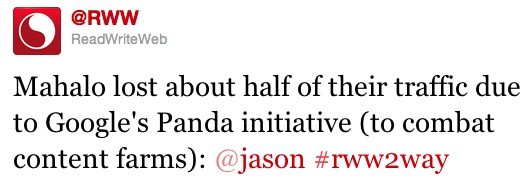How the Human-Curated Web is Winning, Even if Mahalo Isn’t
Mahalo, the Wikipedia-esque human-curated directory of information on various topics, had its traffic cut in half by recent efforts by Google to eliminate spam from its search listings. It seems like the ultimate victory of Google’s algorithm over the attempts to revive the original way to organize the Web, that is, hire a bunch of humans to do it for you. For example, before the Web was so vast it took data centers’ worth of servers to parse it, this is how Yahoo got its start.

But the humans are winning this battle, and Google knows it. Mark Zuckerberg, for all his flaws, is our John Connor in this war with the machines.
It’s rare for a technology to simply go away, and algorithmic search won’t, ever. But spammers and profiteers mean the Internet has become one giant Turing test for search ranking algorithms, and those algorithms are losing, leading to an overall decline in the quality of search as a tool for filtering out signal from noise on the Web.
Hence, the rise of Twitter, Facebook and, eventually, other services that already allow us to probe our network of trusted friends when we have the sort of question that requires an answer we can really trust.
One of the ways Google recognizes the threat is that real-time search is becoming more important for the company – Tweets to the front of the line. Google will even privilege the knowledge lost to our imperfect ability to commit things to long-term memory, such as items you’ve tagged in the bookmarking service Diigo.
Google was only ever as good as its ability to point us to the long tail of human expertise, anyway. Services like Mahalo were an attempt to address its weaknesses, but they failed for one simple reason: they could never hire the people we trust *most* to filter the web for us. Google’s +1 is an attempt to bring human filtering back to the cold machine logic of its algorithms, and we’ll see how well that succeeds.
But increasingly, we’re left where we started when the web was young, when it comes to finding information we can trust – we have to ask someone, a real human, who has already earned it.
Keep Reading
Most Popular
Large language models can do jaw-dropping things. But nobody knows exactly why.
And that's a problem. Figuring it out is one of the biggest scientific puzzles of our time and a crucial step towards controlling more powerful future models.
How scientists traced a mysterious covid case back to six toilets
When wastewater surveillance turns into a hunt for a single infected individual, the ethics get tricky.
The problem with plug-in hybrids? Their drivers.
Plug-in hybrids are often sold as a transition to EVs, but new data from Europe shows we’re still underestimating the emissions they produce.
Stay connected
Get the latest updates from
MIT Technology Review
Discover special offers, top stories, upcoming events, and more.